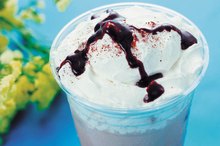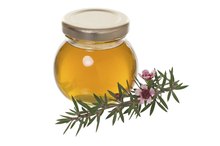Does Unsweetened Tea Elevate Blood Sugar?
If you have diabetes or are prediabetic, your doctor has probably advised you to watch your sugar and simple carbohydrate intake. Eliminating soft drinks and juice is a simple way to reduce both of these from your diet. Unsweetened tea can be a satisfying option because it doesn't contain any sugar or carbohydrates. Unfortunately, unsweetened tea does contain caffeine. A 2011 issue of the "Journal of Caffeine Research" notes that caffeine can raise blood sugar levels in Type 2 diabetics. If you suffer from Type 2 diabetes, you may want to try decaffeinated tea or herbal teas that are naturally caffeine-free.
Background
Ideally, your normal fasting blood sugar level should be less than 100 mg/dL, according to ClevelandClinic.com. If your level falls between 100 and 125 mg/dL, you’re considered prediabetic, and anything over that typically indicates diabetes. Prediabetics are encouraged to adopt lifestyle changes such as a healthy diet and regular exercise to avoid becoming diabetic. Having an elevated blood sugar level causes numerous complications in diabetics, including the potentially fatal diabetic coma.
- Ideally, your normal fasting blood sugar level should be less than 100 mg/dL, according to ClevelandClinic.com.
Artificial Sweeteners
Decaf Black Tea & Pregnancy
Learn More
If you’re used to consuming soda or other sugary beverages, unsweetened ice tea might not seem all that appealing at first. If you don’t like it plain or with a lemon, consider adding an artificial sweetener. Most artificial sweeteners will not elevate your blood sugar levels. Saccharin, aspartame, acesulfame potassium and sucralose are all safe for diabetics or anyone watching her blood sugar level. On the other hand, sugar alcohols such as xylitol, mannitol and sorbitol will elevate blood sugar slightly.
- If you’re used to consuming soda or other sugary beverages, unsweetened ice tea might not seem all that appealing at first.
- On the other hand, sugar alcohols such as xylitol, mannitol and sorbitol will elevate blood sugar slightly.
Caffeine
Unsweetened ice tea contains caffeine. The exact amount varies based on the brand and how long you brew it for, but it is generally much less than the amount in a cup of coffee. Health practitioners advise healthy adults to consume less than 300 mg of caffeine daily. Since caffeine only appears to affect blood sugar levels in Type 2 diabetics, if you don't suffer from Type 2 diabetes, you can consume caffeinated, unsweetened tea without raising your blood sugar level.
If you do have Type 2 diabetes, talk to your doctor about avoiding or limiting caffeine in your diet. Several studies have found that caffeine raises blood glucose levels and impairs the body's ability to metabolize glucose in Type 2 diabetics. Further research is needed to establish a safe amount of caffeine for Type 2 diabetics, but most of the studies cited negative effects in patients who consumed as little as 200 mg of caffeine daily.
Decaffeinated tea is a better option, but even that contains trace amounts of caffeine. Herbal teas such as ginger or raspberry are naturally caffeine free, so they can be safe for Type 2 diabetics. If you're purchasing premade herbal teas, check the product label to ensure they're not infused with caffeine or caffeinated teas.
- Unsweetened ice tea contains caffeine.
- Further research is needed to establish a safe amount of caffeine for Type 2 diabetics, but most of the studies cited negative effects in patients who consumed as little as 200 mg of caffeine daily.
Considerations
How Many Carbohydrates in a 6-Ounce Glass of Tea?
Learn More
In addition to diet and exercise, other lifestyle changes may help control your blood sugar level. Adding cinnamon to your diet can also control blood sugar levels in people with Type 2 diabetes, according to the American Diabetes Association. Processed foods that contain cinnamon, such as cereals and baked goods, tend to be high in sugar, so instead add cinnamon to homemade dishes or talk to your doctor about a cinnamon supplement.
Related Articles
References
- University of Iowa Hospitals and Clinics: Caffeine: How Much Is Too Much?
- Journal of Caffeine Research: Caffeine, Glucose Metabolism and Type 2 Diabetes
- Diabetes Care: Cinnamon Improves Glucose and Lipids of People With Type 2 Diabetes
- Meredith SE, Juliano LM, Hughes JR, Griffiths RR. Caffeine Use Disorder: A Comprehensive Review and Research Agenda. J Caffeine Res. 2013;3(3):114-130. doi:10.1089/jcr.2013.0016
- Richards G, Smith AP. A Review of Energy Drinks and Mental Health, with a Focus on Stress, Anxiety, and Depression. J Caffeine Res. 2016;6(2):49-63. doi:10.1089/jcr.2015.0033
- Brunyé TT, Mahoney CR, Rapp DN, Ditman T, Taylor HA. Caffeine enhances real-world language processing: evidence from a proofreading task. J Exp Psychol Appl. 2012;18(1):95-108. doi:10.1037/a0025851
- Koppelstaetter F, Poeppel TD, Siedentopf CM, et al. Caffeine and cognition in functional magnetic resonance imaging. J Alzheimers Dis. 2010;20 Suppl 1:S71-84. doi:10.3233/JAD-2010-1417
- Harrell PT, Juliano LM. Caffeine expectancies influence the subjective and behavioral effects of caffeine. Psychopharmacology (Berl). 2009;207(2):335-42. doi:10.1007/s00213-009-1658-5
- Lucas M, O'reilly EJ, Pan A, et al. Coffee, caffeine, and risk of completed suicide: results from three prospective cohorts of American adults. World J Biol Psychiatry. 2014;15(5):377-86. doi:10.3109/15622975.2013.795243
- Abdel-Hady H, Nasef N, Shabaan AE, Nour I. Caffeine therapy in preterm infants. World J Clin Pediatr. 2015;4(4):81-93. doi:10.5409/wjcp.v4.i4.81
- American Psychiatric Association. Diagnostic and Statistical Manual of Mental Disorders. 5th edition. Washington DC; 2013.
- Turnbull D, Rodricks JV, Mariano GF, Chowdhury F. Caffeine and cardiovascular health. Regul Toxicol Pharmacol. 2017;89:165-185. doi:10.1016/j.yrtph.2017.07.025
- Centers for Disease Control and Prevention. Alcohol and Caffeine. Updated October 23, 2018.
- Alsunni AA. Energy Drink Consumption: Beneficial and Adverse Health Effects. Int J Health Sci (Qassim). 2015;9(4):468-474.
- Lyngsø J, Ramlau-Hansen CH, Bay B, Ingerslev HJ, Hulman A, Kesmodel US. Association between coffee or caffeine consumption and fecundity and fertility: a systematic review and dose-response meta-analysis. Clin Epidemiol. 2017;9:699-719. doi:10.2147/CLEP.S146496
- U.S. Food and Drug Administration. Pure and Highly Concentrated Caffeine. Updated September 21, 2018.
- National Institute on Drug Abuse. Drugs, Brains, and Behavior: The Science of Addiction. Updated July 2018.
Resources
Writer Bio
Maria Price worked as an editor for a medical publishing company for several years. She now does freelance editing and writing for various companies both in and out of the medical field. Price has a Master of Science degree from Drexel University in publications management.









